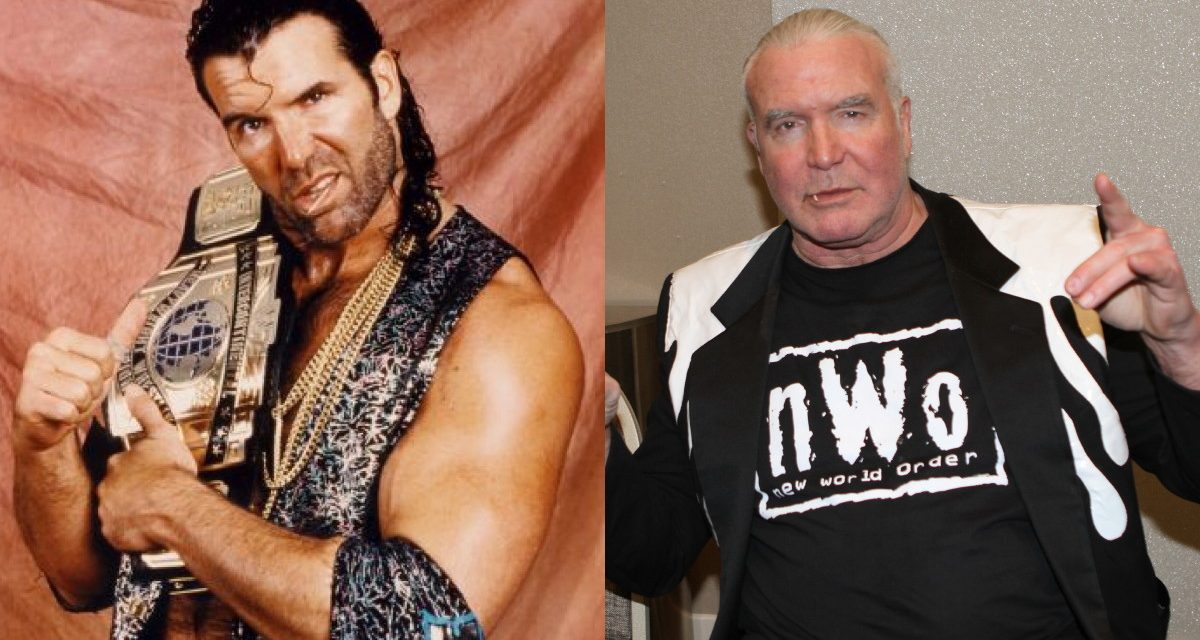It may be hard to believe, but Scott Hall hasn’t appeared in Canada for over a decade. After all, he’s one of the biggest names of the modern wrestling business, yet he hasn’t been up here since WrestleMania X8, not for an indy show, a signing, or even to visit friends. Well, that gets rectified this weekend, when Hall appears as part of Border City Wrestling’s huge 20th anniversary show in Windsor, Ontario.
“It has been a long time,” confirmed Hall in an exclusive interview with SLAM! Wrestling days before the big event. “It was WrestleMania X8 in Toronto. Which is too bad, because I really love Canada. The geography is beautiful. I’ve been to all the big Canadian cities, but also so many of the little towns all over Canada — actually, it’s probably easier to talk about the places that I haven’t been. I really love coming up there, and I’m happy to be back.”
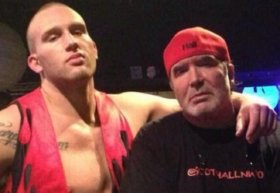
Cody and Scott Hall.
It’s also a bit closer to home than some of his other upcoming travels, which include some appearances in Europe and Asia.
“I’ve got some dates coming up in Europe in November with Kevin Nash and Sean Waltman — doing a WolfPac signing and a question and answer (session). I think we’re doing Glasgow, Manchester, and London. Then we’re looking at some things in Japan.”
Having come off of a major surgery — Hall had a complete hip replacement about five months ago — he’s being very selective in terms of what shows he’ll attend while rehabbing the injury.
A large factor in his travels today is the chance to accompany his son Cody, who has started his own wrestling career, and will be competing at the BCW show.
“Now that Cody’s breaking into the wrestling business — he’s had 20 or so matches so far — we’re looking at some international bookings to get him seasoned and ready for anything that may happen for him in the U.S.”
The other reason, Hall said, is that he simply loves to travel. He credits catching the travel bug to his childhood. As an army brat, Hall literally grew up on military bases all over the world.
“Yeah, for sure,” he confirmed. “That’s probably why I’m in my fifties with a ponytail, because I grew up with white-walls. I had a crewcut, and I was saying ‘Yes sir, no sir’ to everybody.”
Still, while his upbringing may have been strict, it was his father that took him to his first wrestling match where a young Scott discovered the life he wanted to live.
“My dad took me and my buddies to a match when I was eight years old,” he remembered. “We were stationed somewhere in the south-east U.S., either at Fort Benning, Georgia, or Fort Rucker, Alabama, somewhere in the deep south. There was a little wrestling promotion in town, and we went to the show for my birthday. It was my eighth birthday.”
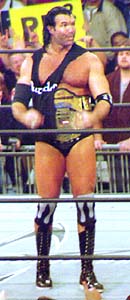
Scott Hall, champion in WCW.
“I’ll never forget, it was a hair match, the loser had to have his head shaved. I still have the program and a piece of the dude’s hair, at my mom’s house,” he laughed. “That (show) really made an impact on me. I thought it was just such a cool way to make a living. I thought it was a cool lifestyle, it really appealed to me.”
Of course, being eight years old, Hall would have to wait to grow his hair out and turn towards his eventual “outlaw” ways. It wasn’t until after high school that he decided to pursue wrestling as a career.
“We were living in Germany, and I was at a really small high school there, kids of American servicemen. I was playing basketball there, and at that school, I was a big deal. And so I thought that maybe I could try playing pro ball. Because they have pro basketball in Europe for guys who aren’t good enough to play in the NBA, but can still earn enough to make a comfortable living playing pro basketball in Europe. And that whole life of being a pro athlete was really appealing to me.”
“And I was always watching wrestling on TV going along,” he continued. “So when high school ended — I had no interest in going to college — I thought to myself, ‘Wow, I’m out of school, now I have to grow up and make a living and pay bills. What am I going to do with my life?’ Sports entertainment was a term that hadn’t been coined yet, but pro wrestling was around. And I was always drawn to that carefree lifestyle, and I liked the physicality and the athleticism involved.” So the decision for Hall to get into wrestling was an easy one.
Naturally big, Hall trained to bulk up even more, and went from 230 pounds up to 292 to start his career. “And I did that steroid free,” he clarified. “I wanted to get big clean, that’s what was recommended to me.”
Which is not to say that Hall is completely against steroid use. In a candid aside — and Hall has never been one known for holding back — he shared his views on steroid use by pro athletes.
“If you’re going to try to be a pro athlete, why not use everything available to you? I’m not trying to get too involved in (the discussion), but I don’t have a problem with pro athletes being on steroids,” he said. “You read about all of these baseball players getting in trouble, but I think there are a lot more important things going on in the world today than whether pro athletes use steroids to perform good. I’m not a big baseball fan, but I remember back when all those guys were hitting home runs all the time, and it was just more fun to watch. I don’t think people are getting hurt, I don’t think these guys were breaking into peoples’ houses or robbing old ladies’ purses to get the money to run out and buy steroids.”
“When I went to WWF — it was still WWF at the time — when I was there as Razor Ramon, it was when the steroids scandal was in full swing. They were testing, and I was fully compliant with the drug policy. I went off steroids like everybody else did. And we all got smaller, but the playing field remained level. Big guys were still big, and the little guys were still little. But the reality is, when you’re on the road so many days, I don’t see how a little bit of steroids can really hurt anything. There are a lot of things that people could do that are a lot worse.”
That being said, Hall does also appreciate that the attitude towards steroids in the business has changed since his heyday. “That was just the time,” he noted. “That was then, and now is now. I’m living my life a lot differently now. And I’m happy to hear that the young cats now are not making bad choices — that’s encouraging.”
After training and toiling away in various promotions, including CWF in Florida, and the AWA, and a short stint in WCW, Hall hit the true big time when he joined the WWF as wrestling’s “Bad Guy”, Razor Ramon.
So much has been documented about Hall’s storied WWE run that this interview didn’t delve too much into this period, other than towards the end, when Hall decided to leave the company and head to WCW. It was a decision purely motivated by the bottom line, Hall said.
“I left for the guaranteed money (that WCW offered),” he said simply. “I was very happy there with that run as Razor, but at the end of the day, it’s not ‘show friendship,’ it’s ‘show business‘. I didn’t want to go. I was happy, but I wanted to be compensated. I did the only thing I knew to do, which was to ask Vince for more money. He said ‘no’, so I gave my notice as required by my contract, 90 days written notice, and did everything they wanted me to do until it was time to leave.”
“Kev (Kevin Nash)’s contract was up a just about the same time, and I talked with him about going,” he said. “He first said he wanted to stay (with WWF), but then a day later he said, ‘I’m going too.'”
Both of them having been in WCW before their WWF runs, they were a bit wary of what they might find, and had some trepidation, even as their WWF careers came to a close.
“I remember leaving Madison Square Garden after my last match for Vince at that time,” he said about that last show. “I worked against Triple H, and Kev worked with Shawn. We were all riding together, traveling together. We were leaving the building thinking, ‘This is kind of crazy, this is so weird.’ Me and Kev were happy that we’d had a successful run, nobody got hurt. We were happy for Shawn because we knew that he’d now be getting his big push, his first run as world champion. Hunter was still a young guy, but he was a good worker, so we knew he’d be okay. But it was still in my mind, ‘Oh now, now what? I know I’m getting paid, but who knows what it’s going to be like down there.’ The only thing I knew is that Kev was coming, so at least I’d have one friend there.”
Of course, it was there that the two friends would go on to change the landscape of the industry, and some would say, the business as a whole, as part of the New World Order. The nWo storyline was one of the most successful storylines ever, and many credit this with changing the wrestling business forever.
“It’s funny,” he reflected on that comment. “Looking back, (originally I thought) I was just changing bosses. And I was worried about it — (I’d) been there before, with little success, so I’ll admit, I came in with a chip on my shoulder.”
But when the nWo took off the way it did, Hall basked in the success. In interviews, some Hollywood stars and rock stars say that they didn’t know they’d hit the big time until well after the fact. Not so with Hall.
“That’s what made it so cool,” he confirmed. “Kev and I had been in the business a number of years. Then hooking up with Hogan, who had already had such a successful run with the Hulkamania, you then had three guys who had been around. We definitely knew what was going on, and we enjoyed it to the fullest.”
“Because my dues were well-paid in advance, I’d paid in full. I’d been through all sorts of small territories. I’d been a mid-card guy for a number of years, so really appreciated being on top. I knew that the Razor gimmick was working and that stuff that I created worked. And that felt great, it was satisfying. So I had already achieved some creative success and knew I was good at what I do, and that had been acknowledged by my peers and the people that I respect. But I wanted the money, the guaranteed money. That’s why I was there. I felt like it was my duty to enjoy it.”
Though he was also struggling with some of the decisions that were being made by the company.
“They were silly. Because guys had guaranteed salaries, their destiny was pre-determined. For example, in their eyes, a guy making 750 grand a year could never lose to a guy making 250 grand a year. Whereas what I liked about WWE and the way Vince did things is that he gave everyone a chance at bat. All you need in this business is a chance at bat. Sometimes you hit a single, sometimes you may strike out. But sometimes you may hit a home run. Sometimes you just have to point the camera on someone and they’ll deliver. I think that we were giving the people whatever they wanted.”
It was about this time that Hall’s personal demons started to emerge. His battles with booze and pills became more public, and in an effort to blur the lines between his on-screen character and his real life, the company turned this into an on-screen storyline at one point.
“They had one storyline where I was drinking before — and sometimes during — matches,” he recalled. “But in real life, I was never drinking before shows back then. Was I drinking after the shows? Yeah. A lot. But not before. Because anyone who’s ever done anything athletically knows that the last thing you want is a belly full of beer before you’re jumping around and moving around. No thank you. Afterwards, yeah, there weren’t enough drinks for me after the show.”
Those battles continued throughout his time in WCW right up to the end of the company. They also followed him when the nWo was brought back to WWE for a short-lived resurrection of the faction. His personal problems also helped to dampen his enthusiasm.”
“I remember talking with Kevin and Hulk before we went back,” he said, “knowing that it would be an ill-fated venture, because there was no way Vince would get behind something that he didn’t create. Still, I did it because it was a chance to do a little something, and they were paying me well. But it was not very satisfying creatively.”
“So my fake life — my wrestling life — wasn’t very satisfying. And my real life really sucked at the time. So I was like, ‘I don’t need this.’ I was unhappy enough on my own that I didn’t need to be wrestling guys that we weren’t clicking with. It was kind of all melting around me at the time, so I couldn’t get out of there fast enough.”
After that stint came to an end, Hall made a number of appearances for the then-startup, TNA Wrestling, including appearing on the company’s first pay-per-view broadcast.
“My home in Florida isn’t that far from where they used to film in Universal Studios. Kev was working there, and he’d often call me and ask to go down there. I was on the first TNA broadcast ever. That’s back when Jerry Jarrett was the owner and the mind of TNA. I did their first pay-per-view out of Birmingham, Alabama, just an appearance in the crowd. I did a few shows early on, and I really liked it, because I really liked working with Jerry.”
But Hall was looking for something more stable at that point in his life, and soon his appearances became more sporadic and eventually not at all.
“I had a lot of personal problems in my life,” he explained. “I was looking for wrestling to be an escape and a distraction for me, so I was hoping to be part of a smooth-running machine. I didn’t want to be on the ground-up. And I knew what I was getting into, but it was too much.”
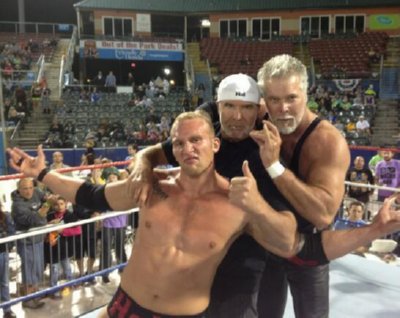
Cody Hall, Scott Hall and Kevin Nash.
His battles with the bottle became even more publicized at around that time, and soon wrestling fans were hearing more about those issues than Hall’s in-ring exploits. Those problems led to health issues, troubles with the law, and numerous rehab stints. Hall’s story was even documented on a piece on ESPN, where his addictions and the consequences of same were highlighted in almost gruesome detail.
“I’ve often wondered,” he speculated, “if me having an issue with booze and pills would have been an issue if I’d worked at a gas station.”
While Hall’s story could have ended tragically with that video acting as a living eulogy, fortunately, he was able to finally get the help he needed. With the help of his friend, Diamond Dallas Page, Hall was able to fight his addiction, a fight he’s winning on a day-by-day basis.
“It’s the middle of the day where I am now, and I haven’t had a drink,” he said, in that same vein. “I don’t know if I’ll have one later today. But the difference now is that I don’t want to. I don’t want to drink. I don’t drink at all anymore, and I’m really happy about that.”
When asked about what specifically changed within him, Hall honestly admits to not knowing.
“I wish I did. I certainly went through all the traditional rehab places — 12 of them. And I paid attention, and I tried to apply the lessons. But I actually had success doing things that are counter to what those places say. They don’t recommend major geographic changes; I moved. So I honestly can’t answer what it was, if it was environmental or if it was genetically coded. I wish I did, because — and I’m not trying to make my gimmick ‘Captain Rehab’ or anything — but if I did, I would tell people. I would tell everybody out there who’s suffering. I was in real pain, so I know it’s a real issue. But I don’t know the secret, I only know what’s working for me.”
And because it is, this has given Hall a new lease on life. And with it, a chance to play a new role in wrestling — that of mentor and trainer to his son Cody.
“I feel so happy that I still feel connected to wrestling on such a fundamental way because of Cody,” he said. “It makes me feel relevant again. We go someplace, and I sign autographs and Cody wrestles. I feel like we’re covering all the bases. I’m there to tell stories, and he’s in the ring keeping it fresh. It’s a blast.”
That will be the case at the BCW show, where Cody will be wrestling in a six-man tag along with former TNA star Cody Deaner and BCW Champion Phil Atlas against The Syndicate, consisting of Tyson Dux, Jon Bolen, and one of BCW’s founding fathers, “Coach” Scott D’Amore, making a rare in-ring appearance.
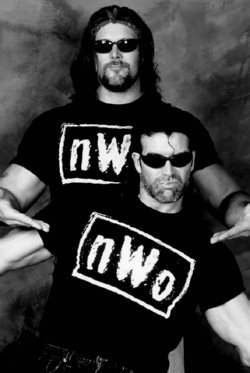
Hall and Nash in their glory days.
Hall will be in the corner of his son’s team, and he says it’s a thrill every time he gets the chance to see his son compete.
“It’s so much fun to see him experience live audiences,” he said. “Of all the substances I’ve delved into in my life, I found the best buzz is the feedback from a live audience when you’re out there entertaining them. It’s fun to see Cody learn that craft and go down this road in pro wrestling.”
Of course, one would think that Cody would love to have his father there offering advice — after all, to learn from a true master must be a great advantage of how to succeed in the business, right?
“Can you put that in writing for me?” Hall joked. “I want that put down in writing, and put it in bold-face, so I can show it to him. Because this is what I go through. To him, I’m not Razor, I’m not a wrestling guy. To him, I’m Dad. So anything I say, (he’s) like ‘Oh, it’s my Dad telling me something, so it’s not cool.’ Anything I say to him, it’s not cool.”
“But of course, I still bombard him with my theories about wrestling,” he laughed. “There’s no way he can get away from it, since I’m staying with him right now at his place in Atlanta. He’s got no choice. I make it like a training camp here. We train together. I get in the ring with him and show him some moves — now, I’m not going to paint the wrong picture, I’m not bumping all over for him, he’s got smaller guys there that he can toss around — but I get in there with him. And when we come back here, we’ve got a big screen TV, and we watch wrestling.”
Hall isn’t the only one giving Cody pointers, though. Two other Canadians, Lance Storm and Roddy Piper, have also been giving him tips, going over his matches, and offering advice.
“He’s a smart kid,” Hall said about his son. “He stays current on everything. He trains at a couple of schools: Hard Knox in Kennesaw, Georgia, and WWA4, which is (former WCW star) Curtis Hughes’ school in Atlanta. It makes me feel really excited again about pro wrestling, I’ve got to admit. The brain trust surrounding him, we’re trying to make him a main-eventer. Nobody breaks into any industry to work their way to the middle. We’re programming him to be a top guy, and so far, he’s living up to the hype.”
But Hall knows, from his own experiences, that success doesn’t happen overnight, and he’s not suggesting that this is what he has in mind for Cody.
“There’s no pressure on him,” he confirmed. “He’s only had 20 matches. And he’s only 22 years old. So first of all, we’re going to enjoy this family time together, and see the world together. We have the opportunity to do some stuff in Europe and in Asia that we want to explore before we worry about any big-time stuff with WWE.”
Though that’s obviously the long-term objective. In fact, Hall has an idea that he would like to come to fruition should the opportunity ever present itself that would involve both he and his son.
“It would be a dream come true for me,” he said about working for WWE again, “but I want to clarify, it’s not up to me.”
“If it were up to me,” he continued, “then I would love to have the Bobby Heenan job. I was always a big fan of Bobby Heenan. I would love to wear the headphones and a tacky sports coat, and be the heel commentator who just managed a select couple of guys. Bobby used to put down the headphones and head to the ring to manage Mr. Perfect and then Ric Flair. In my own fantasy world, created solely by me, I would love to be the Bobby Heenan broadcaster and then walk to the ring with Cody and maybe manage a sweet tag team and maybe one Diva. That would be my stable, and I’d be fine with that.”
“It’d be ‘Hall good,'” he punned.
Even if that plan doesn’t come to pass, that’s fine with Hall; he’s at a place and a point in his life where he’s truly happy. Sober and surrounded by family, it’s as if he is finally having the success in his self-described roller coaster of a personal life as he did in his professional life.
“To me, the greatest title to have is ‘Dad.'” In addition to Cody, Hall also has a daughter named Cassidy — “sometimes, she’ll come to bigger shows with us, and she’ll have a blast collecting the money from our merch sales”.
“I was playing an ‘Outlaw’, playing ‘Da Bad Guy’. But I just love being ‘Dad.’
“When I was really struggling with my personal demons, just making some bad decisions and living a self-destructive life, a lot of people reminded me of things that I had helped them with. People sent me the old vignettes of Razor, where I’d say, ‘Hey. I’m from the streets. No education. It doesn’t matter.’ For me, if you don’t quit, you never lose … you have to just keep getting up.”
“I accomplished all of the things that I thought should make me happy — I thought having a big bank account and all this stuff would be it. But on the way, I lost things that were way more important — relationships with people that really matter. So now I’m blessed to have lived long enough that I get a chance to try to do it all over again, but this time hang onto relationships and not worry about the bank account. Life is good, man. Life is good.”
RELATED LINKS
